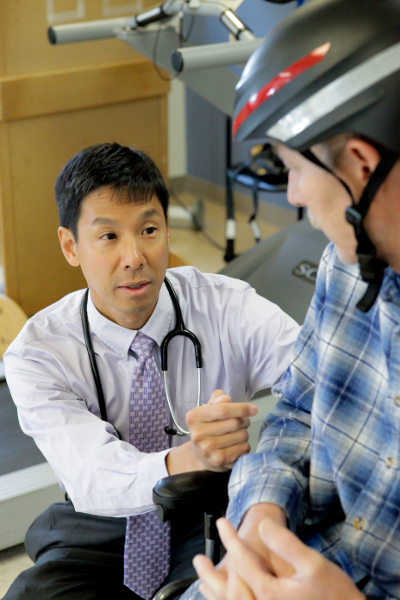In March 2016, MossRehab began recruiting patients for two unique industry-sponsored clinical trials that will examine the safety and efficacy of using stem cells to help promote motor recovery after stroke and traumatic brain injury (TBI). Only four rehabilitation organizations in the U.S. were selected to take part.

“We are excited that MossRehab was chosen to participate in these studies,” says Thomas Watanabe, MD, clinical director of the Drucker Brain Injury Center and the Stroke and Neurological Diseases Center. “Stem cell-based therapy, which is already playing an integral role in bone marrow transplantation and other treatments, is among the most innovative approaches to potentially enhancing recovery for people who have had strokes and traumatic brain injuries.” Dr. Watanabe will serve as MossRehab’s principal investigator for these trials, and will head a team that includes co-investigator Michael Marino, MD, an attending brain injury physician at MossRehab, and two therapists involved in patient evaluations and a research coordinator. According to the design of the study, patients selected for treatment will undergo stem cell implantation and then come to MossRehab for follow up, which will include ongoing assessments of strength, ambulation and other functional outcomes. Functional brain imaging studies also will be used to evaluate how well patients respond to this intervention.
Restoring function with stem cells
Stem cells are undifferentiated cells that have the potential to develop into many different specialized cell types in the body. Embryonic stem cells, for example, undergo differentiation during the development of a fetus, and eventually become the specialized cells that form the heart, lungs and all other organs of the body. Adult stem cells, such as those in bone marrow, kidneys, or skin are capable of giving rise to new specialized cells as needed during times of growth or repair.
Although patients who undergo bone marrow transplants typically receive stem cells from their own bodies or from donors, the stem cells that will be used to repair brain injury in these new studies were developed by the study sponsor.
“Historically, it was thought that neurons were not capable of regeneration—that once they were lost, they could not be replaced,” says Dr. Watanabe. “However we know now that there are stem cells in the brain that continue to develop into different types of neuronal cells. For these studies we will be using special adult stem cells, which have undergone testing to make sure that after they are injected into the brain, they will be compatible.”
Introducing new stem cells may help patients recover, in part, by replacing cells that have been damaged by TBI or stroke. After the cells are injected, they will undergo a process of adaptation, during which they may gradually begin to carry on the functions of the cells that were lost due to injury. The donor cells also will likely help repair injured tissue by providing an environment that is more supportive for existing neurons, one that encourages them to engage in repair after injury.
Recruiting patients
“Since March, we began recruiting a small number of patients,” says Dr. Watanabe. “Initially we aim to have about six patients in each study, who must meet very detailed inclusion and exclusion criteria.”
Patients from rehabilitation organizations other than MossRehab may be eligible to participate. All patients, between the ages of 18 and 75 years old, must have a neurological motor deficit caused by TBI or stroke. Eligible patients also must be willing to undergo cell implantation and all planned neurological assessments at MossRehab, and must be able and willing to undergo magnetic resonance imaging (MRI) with contrast, and computed tomography (CT). Individuals with certain neurological and systemic diseases, or uncontrolled psychiatric disorders, are not eligible to participate.